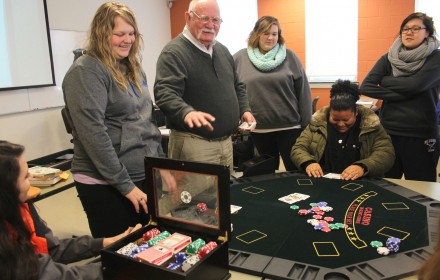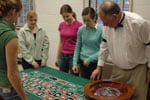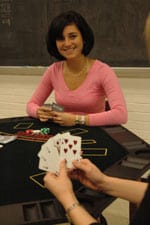Are the Odds in Your Favor?

Lottery ads practically permeate many of the country’s rural and urban landscapes—all very positive and quite provocative. Winning the astronomical jackpot is a chance South Carolinians pay millions of dollars to take—in both the lottery and the casinos that can be found nearby. But how great a chance do they really have of winning?
 Dr. James Hymas, Chair of Converse College’s Mathematics Department, addresses that issue in his popular January Term course The Mathematics of Gambling and Games of Chance. During the four-week class, students learn how mathematics is involved in games of chance and gambling by studying topics in probability, statistics and combinatorics. The class includes extended laboratory sessions and even a “casino night” to put their knowledge to practical use.
Dr. James Hymas, Chair of Converse College’s Mathematics Department, addresses that issue in his popular January Term course The Mathematics of Gambling and Games of Chance. During the four-week class, students learn how mathematics is involved in games of chance and gambling by studying topics in probability, statistics and combinatorics. The class includes extended laboratory sessions and even a “casino night” to put their knowledge to practical use.
Hymas says the class has a three-fold purpose:
- To introduce and develop the mathematics necessary for a rational analysis of various gambling applications
- To directly observe the applications of the mathematical principles used in various games
- To increase students’ interest in mathematics
The interesting concept of studying mathematics through games of chance draws many of the students. “The title of the class caught my attention,” said Claiborne Fant. “I was pleased with the variety of information that we learned. It was very instructive and lots of fun!”
“I was pleased with the variety of information that we learned. It was very instructive and lots of fun!”
Hymas focuses on lots of student involvement. “Each student was given $500 of virtual money to gamble with during the term,” he said of one class. “They could bet on sports books, the lottery and on the games we were playing during laboratory sessions.” The classroom even had a Roulette table and a casino card table.
Along with learning how mathematics principles are at work while gamblers are at play, students also learn the history of gambling, dangers of gambling addictions and valuable strategies to use at the tables.
“Dr. Hymas taught us about the role of probability in gambling, how to play different games, how to find out the mathematical expectation of those games (i.e. which games have better payouts for the player), and other concepts in math that can be applied to gambling,” Fant said.
 But the students didn’t just get classroom knowledge. The curriculum included two field trips. One trip was to the South Carolina Lottery Headquarters where lottery officials gave a two hour presentation on lottery marketing, creation of new games and how the profits are actually distributed. Another was to the Sun Cruz Casino Cruise Ship in Myrtle Beach, where students toured the casino and received a presentation by the casino manager and lessons in Blackjack, Roulette and Craps.
But the students didn’t just get classroom knowledge. The curriculum included two field trips. One trip was to the South Carolina Lottery Headquarters where lottery officials gave a two hour presentation on lottery marketing, creation of new games and how the profits are actually distributed. Another was to the Sun Cruz Casino Cruise Ship in Myrtle Beach, where students toured the casino and received a presentation by the casino manager and lessons in Blackjack, Roulette and Craps.
Students come away from the class with more than math principles. When asked to name the most valuable lesson they learned, the response is overwhelming: it doesn’t pay to gamble. Says Fant: “The class essentially explained why it is important to remember that gambling is generally profitable for those running it and not those playing it!”